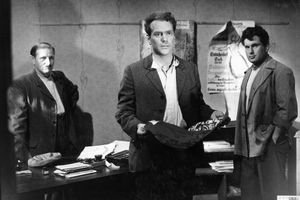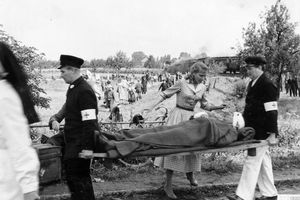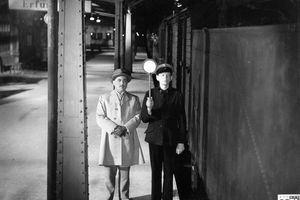Polonia-Express
Director: Kurt Jung-Alsen, 74 Min., Black-White, Feature Film
Deutsche Demokratische Republik (DDR)
DEFA-Studio für Spielfilme, 1957
- Film/Video Format
- 35 mm
- Length in m
- 2043
- Other Title
- Rote Funken; Poloniazug
- English Title
- Polonia Express
- Premiere Date
- Release Date (for Cinema)
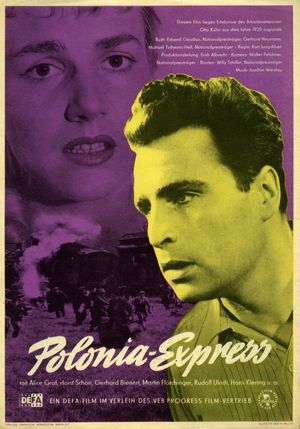
(Dir.: Kurt Jung-Alsen, 1957)
Short Summary (English)
Railway employee Fritz Marr is not regarded well by his superiors. It is the year 1920, and trains regularly pass the railway hub of Erfurt to the East to secretly transport weapons for the fight against the young Soviet Union. Marr knows about this and wants to mobilise other workers to stop these illegal deliveries. To muzzle him, Marr is relocated to a remote rail work construction site. Even when a railway wagon loaded with ammunition explodes near Erfurt, authorities still try to cover-up the incident and make the public believe that it was an accident with chemicals. Marr, who knows the truth, is accused of lying by the direction of the Reichsbahn. Even his girlfriend Hella believes that Fritz is paranoid. But then the railway employee is nearly assassinated: Hella, who just in time learned the truth about the weapons delivery, is able to prevent the murder attempt with the help of some of her worker friends. Together, they march towards the train station to stop the next weapons transport. Eventually, even the French soldiers standing guard take the side of the Erfurt workers.
(Quelle: filmportal)
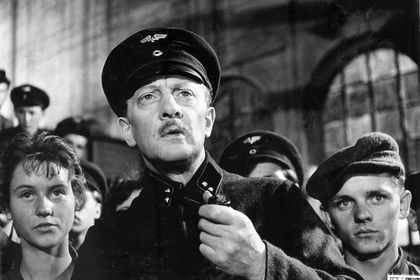
(Dir.: Kurt Jung-Alsen, 1957) Photography: Max Teschner
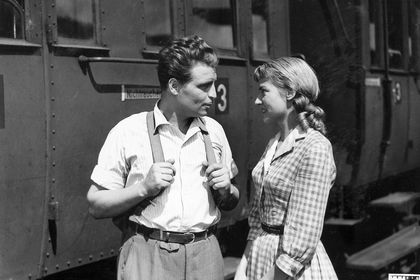
(Dir.: Kurt Jung-Alsen, 1957) Photography: Max Teschner
Film Crew
- Director
-
- Kurt Jung-Alsen
- Script
-
- Gerhard Neumann
- Eduard Claudius
- Kurt Jung-Alsen
- Frank Beyer
- Camera
-
- Walter Fehdmer
- Film Editing
-
- Ruth Moegelin
- Cast
-
- Alice Graf (Hella Merkel)
- Horst Schön (Fritz Marr)
- Gerhard Bienert (Wilhelm Merkel)
- Martin Flörchinger (Direktor Ralow)
- Rudolf Ulrich (Althoff)
- Hans Klering (Schwerte)
- Harry Gillmann (Riemer)
- Hans-Peter Minetti (Lehnert)
- Hans Wehrl (Älterer Arbeiter)
- Hans W. Hamacher (Von Ulmer)
- Jochen Thomas (Baßtreter)
- Gerd Biewer (Französischer Offizier)
- Horst Lommatzsch (Gutsinspektor)
- Wilhelm Gröhl (Spießbürger)
- Horst Kube (Ernst Kölling)
- Erik S. Klein (Leutnant)
- Fritz Ernst Fechner (Arbeiter)
- Erich Mirek (Arbeiter)
- Paul Pfingst (Arbeiter)
- Gerry Wolff (Französischer Soldat)
- Charlotte Küter (Frau Riemer)
- Editha Horn (Ralows Sekretärin)
- Willi Endtresser (Eisenbahner)
- Waldemar Pottier (Beobachter)
- Herbert Malsbender (Französischer Sergeant)
- Herbert Rüdiger (Arbeiter vom RAW)
- Siegfried Fomm (Polizeihauptmann)
- Günther Ballier (Arzt bei Riemer)
- Ulf Torberg (Zeitungsverkäufer)
- Hans-Joachim Hegewald (Lastwagenfahrer)
- Valentin Claus (Polizist)
- Augustin Kovacz (Sanitäter)
- Hans Flössel (Arzt)
- Georg Michael Wagner (Kommis)
- Dieter Perlwitz (Junger, blonder Arbeiter)
- Egon Vogel (Fahrdienstleiter)
- Paul Bieleke (Hotelportier)
- Oswald Foerderer (Wachtmeister)
- Gerfried Höhn (Schreiber)
- Axel Thiessen (Polizist)
- Jürgen Degenhardt (Eisenbahner im Stellwerk)
- Wolf Berkel (Arbeiter im RAW)
- Arno Wolf (Eisenbahner im RAW)
- Gertrud-Elisabeth Zillmer (Sekretärin von Lehnert)
- W. G. Backert (Arbeiter an Gleisbaustelle)
- Peter Gaefke (Hotelboy)
- Erich Braun (Eisenbahner)
- Frtiz Trapp (Streifenpolizist)
- Walter Amtrup (Aufsichtsbeamter)
- Ilse Bastubbe (Tänzerin)
- Hartmut Reck (Arbeiter)
- Karl-Heinz Weiß (Arbeiter)
- Adolf Adler (Französischer Soldat)
- Ralf Bregazzi (Französischer Soldat)
- Gerhard Einert (Französischer Soldat)
- Hans-Ulrich Lauffer (Französischer Soldat)
- Assistant Director
-
- Frank Beyer
- Assistant Camera
-
- Walter Küppers
- Detlef Hertelt
- Production Design
-
- Willy Schiller
- Script Editing
-
- Wolfgang Ebeling
- Music
-
- Joachim Werzlau
- Sound
-
- Erich Schmidt
- Costume Design
-
- Rosemarie Wandelt
- Make-Up
-
- Kurt Dreier
- Vera Schlawin
- Props
-
- Theo (auch: Theodor) Görgens
- Production Management
-
- Erich Albrecht
- Unit Production Management
-
- Lothar Klunter
- DEFA Photography
-
- Max Teschner
Short Summary (German)
1920: Über den Eisenbahnknotenpunkt Erfurt rollen mit Waffen beladene Züge in Richtung Osten. Waffen, die zum Kampf gegen den jungen Sowjetstaat bestimmt sind. Der Eisenbahner Fritz Marr weiß um die illegalen Transporte und versucht, die Arbeiter zu Gegenmaßnahmen zu mobilisieren. Man versetzt ihn auf eine abgelegene Gleisbaustelle. Als ein Waggon unweit von Erfurt in die Luft fliegt, gibt man eine Chemikalien-Explosion an. Doch Marr weiß, dass es Munition war. Der Sonderbeauftragte für die Transporte und die Reichsbahndirektion tun alles, um Marr als Lügner hinzustellen. Auch seine Freundin Hella zweifelt an seinen Worten. Erst als ein Mordanschlag gegen ihn geplant wird und Hella sein Haus umstellt sieht, holt sie andere Arbeiter zu Hilfe. Der Mord wird verhindert, und gemeinsam gehen die Arbeiter zum Bahnhof, um den mit Waffen beladenen Polonia-Express zu stoppen. Die den Zug bewachenden französischen Soldaten solidarisieren sich mit den Erfurter Werktätigen.
(Quelle: Das zweite Leben der Filmstadt Babelsberg. DEFA-Spielfilme 1946-1992)
Short Summary (Other Languages)
Nel 1920 dei treni carichi di armi destinate alla lotta contro il giovane Stato sovietico, transitano dal nodo ferroviario di Erfurt verso est. Fritz Marr, impiegato delle ferrovie, sa bene che si tratta di trasporti illegali e cerca di mobilitare gli operai ad adottare delle contromisure. Viene per questo allontanato e mandato a seguire un cantiere ferroviario. Quando, nei pressi di Erfurt, esplode un vagone merci e i responsabili attribuiscono l'esplosione a delle sostanze chimiche, Marr riconosce subito che si è trattato di munizioni. I suoi superiori tentano di farlo passare per un bugiardo e persino la sua fidanzata dubita di lui. Solo di fronte a un tentato omicidio contro di lui, Hella riconoscerà la sua innocenza. Gli operai andranno uniti verso la stazione per fermare il Polonia-Express. I soldati francesi, chiamati a sorvegliare il convoglio, solidarizzeranno con i lavoratori di Erfurt. (Italienisch)

